Chicago Slip and Fall Lawsuit Guide
A slip and fall lawsuit gives injured individuals a legal path to seek compensation when a fall occurs due to unsafe conditions on someone else’s property. These cases can be difficult without the help of legal counsel, especially when dealing with an insurance company that’s focused on minimizing payouts.
At Slip & Fall Injury Lawyers, we’ve handled cases across Chicago and know how to prove negligence and pursue a fair settlement. Book a free consultation today to protect your rights and discuss your legal options.
What Is a Slip and Fall Lawsuit?
A slip and fall lawsuit is a type of personal injury claim filed when someone is injured after slipping, tripping, or falling due to a hazardous condition on someone else’s property. These lawsuits fall under Illinois premises liability law, which holds property owners responsible when they fail to maintain safe conditions.
A slip-and-fall claim seeks to recover compensation for damages caused by the fall. Successful claims depend on proving negligence and showing how the injuries sustained impacted your life.
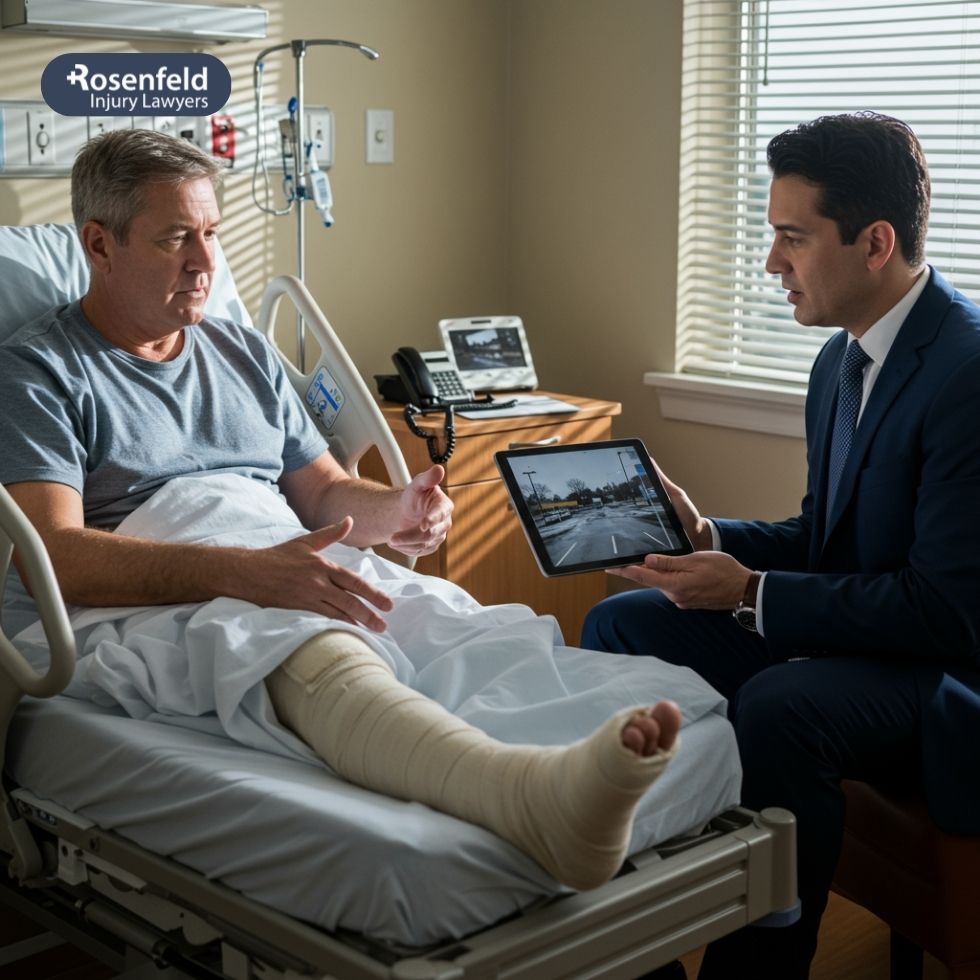
How to Know if You Have a Slip and Fall Case in Chicago
To determine if you have a valid slip and fall case in Chicago, four key elements must be present: duty, breach, causation, and damages.
First, the property owner must have had a legal duty to maintain safe conditions. This generally applies to stores, landlords, businesses, and even private homeowners, depending on the situation.
Next, there must be a breach of that duty, such as failing to clean up a spill, repair broken steps, or place warning signs near hazards.
Third, you must show causation—that someone’s negligence directly caused your fall accident. This means proving you wouldn’t have been hurt if the hazardous condition didn’t exist.
Finally, you must demonstrate damages, including medical bills, lost wages, and the impact of your injuries on your daily life.
If all four elements are met, you likely have a strong fall claim and should speak with a slip and fall lawyer to review your options.
What Is Premises Liability in Chicago Slip and Fall Lawsuits?
Premises liability refers to a property owner’s legal responsibility to maintain reasonably safe conditions for those who enter their property. Whether the fall happened in a store, apartment building, parking lot, or other property open to the public, the injured party must prove the owner failed to correct or warn about a dangerous condition that a reasonable person would have addressed.
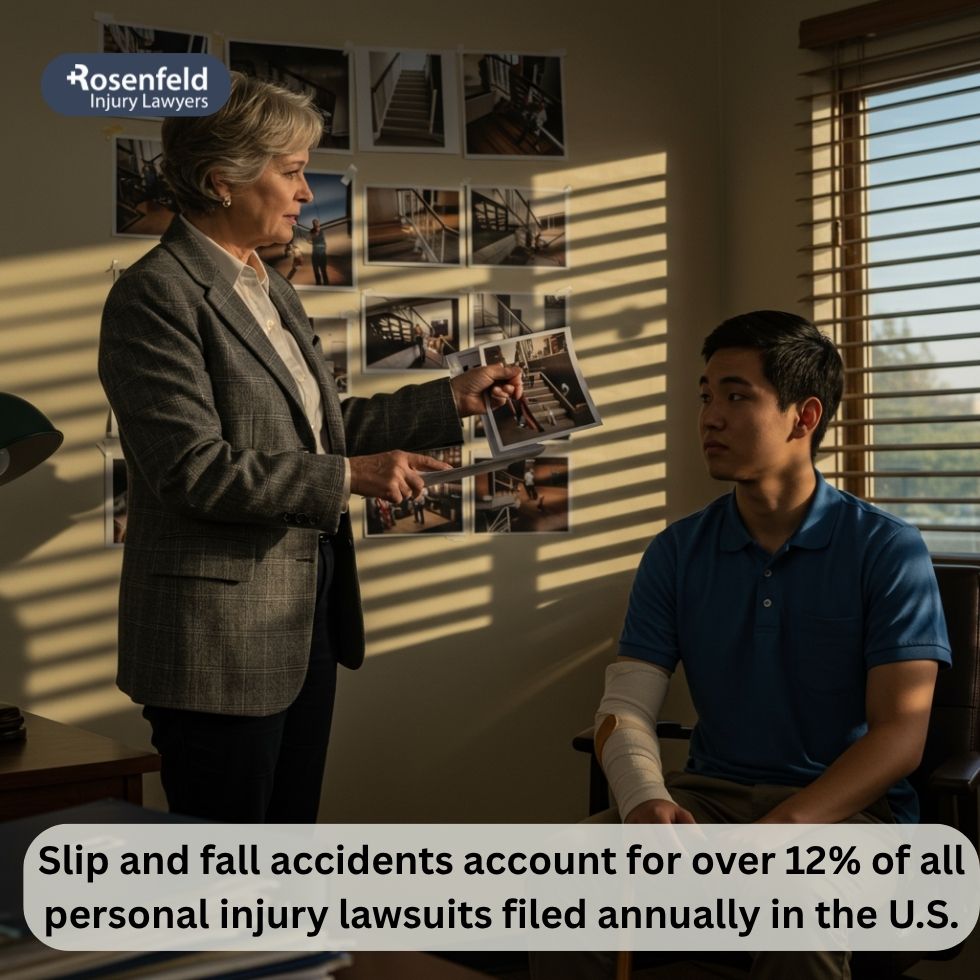
Does a Visitor’s Status Affect a Property Owner’s Duties?
Historically, Illinois followed a system that categorized visitors to a property as invitees, licensees, or trespassers, each owed different levels of legal duty by the property owner.
- Invitees were individuals invited onto the property for business purposes or for the benefit of the property owner, like customers in a store. Property owners owed invitees the highest duty of care, including inspecting the property and warning about or fixing known hazards.
- Licensees were social guests or others lawfully entering the property for their own purposes. Owners owed licensees a duty to warn about known dangers, but were not required to inspect for hidden ones.
- Trespassers entered the property without permission. Property owners owed them minimal duties, typically only refraining from willful or wanton harm.
This structure often led to confusion and inconsistent outcomes in slip and fall cases and other premises liability claims. In response, Illinois passed legislation to simplify and standardize the law.
The Illinois Premises Liability Act (740 ILCS 130/), enacted in 1984, abolished the distinctions between invitees and licensees.
Under this law, property owners owe a duty of reasonable care to all lawful entrants, regardless of their purpose for being on the premises. This includes maintaining safe conditions and either repairing or warning about known hazards, such as wet or slippery floors, uneven pavement, or icy walkways.
Trespassers are still treated differently under Illinois law, but for most visitors, the focus is now on whether the property owner failed to act reasonably under the circumstances.
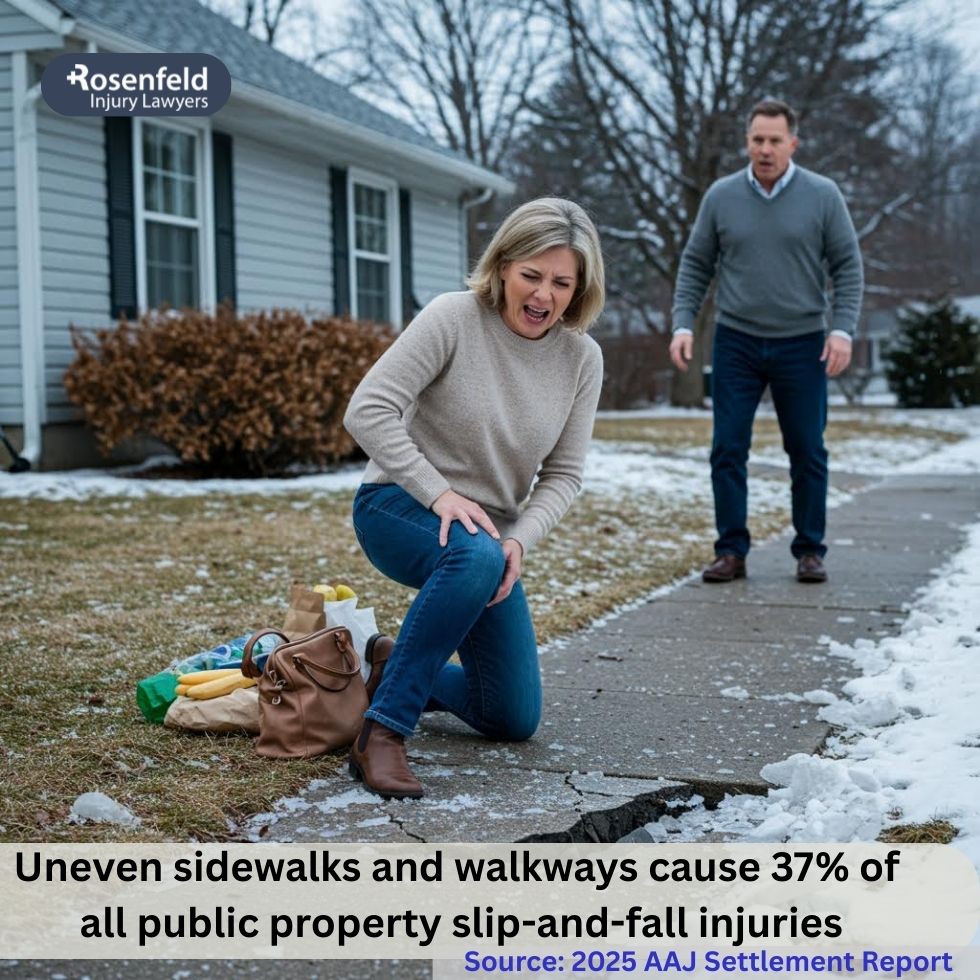
Which Scenarios Are Common in Slip and Fall Lawsuits in Chicago?
Commercial Properties
Slip and fall lawsuits frequently arise in Chicago businesses, especially retail stores, grocery chains, restaurants, and office buildings. These high-traffic environments often present hazards such as wet or freshly mopped floors, spilled food, torn rugs, loose mats, or uneven tiles. Customers may also trip over unsecured wires, poor lighting, or clutter in walkways.
Under Illinois slip and fall laws, commercial property owners and operators have a duty to keep their premises reasonably safe for visitors. That includes conducting regular inspections and promptly addressing hazards. If a business fails to fix or warn about a dangerous condition and a fall occurs, the injured person may file a slip and fall lawsuit to recover medical bills, lost wages, and other damages.
Public Spaces
Slip and fall accidents also occur in Chicago’s public areas, such as CTA stations, sidewalks, crosswalks, parks, and government buildings. Common hazards in these spaces include cracked concrete, poor lighting, snow or ice, and loose debris. When a fall occurs on public property, it may be possible to file a personal injury claim against the responsible government agency.
However, these cases come with unique challenges. Under the Illinois Local Governmental and Governmental Employees Tort Immunity Act, injured individuals must follow strict procedures, including shorter notice periods (as little as one year) and additional filing requirements. Failure to comply can result in a dismissed claim.
Despite these hurdles, a successful lawsuit against a public entity can still lead to compensation for slip and fall injuries. A personal injury lawyer familiar with municipal claims can help meet deadlines and preserve your right to seek compensation.
Private Residences
Falls inside rental properties or private homes are another common basis for slip and fall lawsuits in Chicago. These accidents often happen in common areas like hallways, staircases, or entryways, where conditions such as loose carpeting, clutter, poor lighting, or inadequate repairs create hazards.
In multi-unit buildings, landlords and property managers have a legal obligation to maintain these areas in a safe condition. If they fail to fix or warn about a known danger, they may be liable under Illinois premises liability law.
For example, a tenant or visitor injured in a fall on an unlit stairwell or broken step may file a slip and fall claim against the owner. Even in privately owned homes, a property owner may be responsible if a guest is injured due to a hazard that a reasonable person would have addressed.
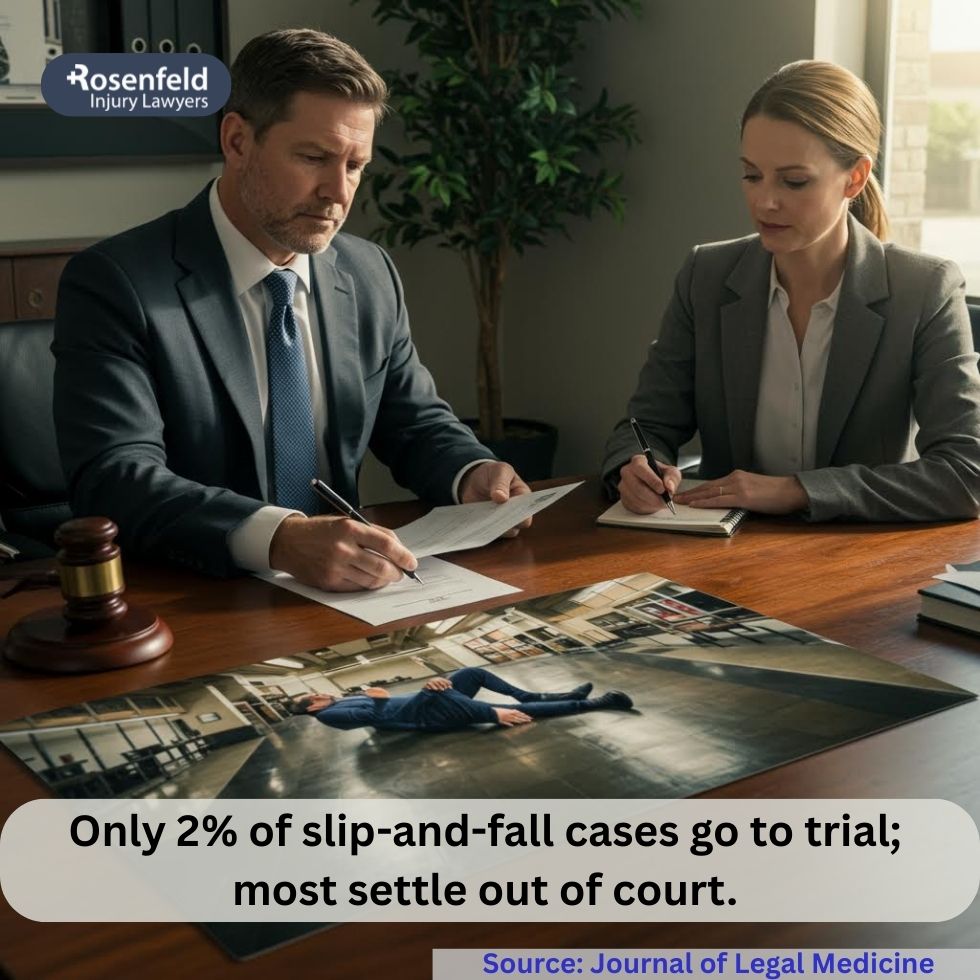
What Causes Slip and Fall Accidents in Chicago?
Wet or Slippery Floors
Slippery surfaces are a common cause of fall accidents in grocery stores, restaurants, and office buildings throughout Chicago. Spilled drinks, mopped floors without warning signs, or leaks from refrigeration units can all create hidden hazards. Whether it’s a South Loop café or a North Side convenience store, failing to dry or mark a wet floor can lead to a serious injury.
Uneven or Broken Surfaces
Cracked sidewalks, loose floor tiles, or uneven concrete are frequent dangers in Chicago’s older neighborhoods and commercial districts. These issues can appear on both public and private property, from residential entryways to CTA station platforms. Property owners who ignore these surface problems may be liable if someone trips and gets hurt.
Poor Lighting
Inadequate lighting in stairwells, apartment hallways, and parking garages increases the risk of falls. Without enough visibility, it becomes hard to detect hazards like torn rugs, changes in floor level, or debris. Tenants and visitors in poorly lit areas—especially in older buildings—are more likely to fall due to conditions they simply can’t see.
Obstructed Pathways
Boxes in store aisles, delivery carts in office buildings, or household clutter in apartment corridors can all block a safe walking path. These obstructions are especially hazardous in high-traffic areas. Businesses and landlords must ensure walkways are clear; failing to do so could result in a slip-and-fall lawsuit if someone is injured.
Snow, Ice, or Rainwater Accumulation
Chicago winters frequently lead to slip-and-fall claims involving icy sidewalks and unshoveled walkways. Melting snow tracked indoors can create slick entryways, while black ice outside often forms without warning. Property owners are expected to clear and salt these areas—especially after storms—to prevent falls.
Leaf-Covered Walkways
In autumn, wet leaves can coat sidewalks and entryways, making them as slippery as ice. Chicago neighborhoods with heavy tree cover, like Lincoln Park or Rogers Park, see many falls related to uncollected leaves. Landlords, homeowners, and business owners are responsible for removing debris that poses a slipping hazard.
Mud or Debris
Construction zones, park paths, and building entrances can become muddy or cluttered, especially during rainy weather. This is common near developing areas like Fulton Market or around city renovation sites. If these materials aren’t cleared or contained, they can lead to serious fall accidents on both public and private property.
Lack of Warning Signs
Whether mopping a floor or dealing with a known plumbing leak, owners and managers must post clear warnings. Without signage, visitors can be caught off guard by a dangerous condition. This is especially true in large retail stores or high-traffic public buildings, where injuries are more likely.
Defective Flooring or Stairways
Loose floorboards, broken tiles, and warped linoleum are common in older Chicago buildings. When stairs are involved, the risk of serious injuries increases. If these defects are known but left unrepaired, the owner may be responsible under premises liability law.
Neglected Carpet or Rug Issues
Frayed carpets, curled edges, or unsecured area rugs can catch someone’s foot and lead to a fall. These hazards often go unnoticed in offices, apartment lobbies, and even waiting rooms. Property owners must secure or replace worn carpeting to ensure safe walking surfaces.
Improper Floor Treatments
Applying too much wax or using a slippery sealant can make floors dangerous, even when dry. Restaurants, malls, and gyms sometimes prioritize appearance over safety, especially during closing hours or renovations. If a treated floor lacks proper traction, the business may be held accountable for resulting injuries.
Broken or Missing Handrails
Staircases without secure handrails are especially dangerous for older adults and individuals with mobility issues. In Chicago apartment buildings and commercial spaces, stairwell handrails must meet local building codes. When they don’t—and someone falls as a result—the owner can face liability.
Unexpected Changes in Flooring
A sudden shift from carpet to tile or from textured to smooth flooring can throw off a person’s balance, especially if there’s no visual cue. This is common in hotel lobbies, entryways, and long corridors. Without proper warnings or transitions, these changes become trip hazards.
Improperly Installed Mats or Floor Runners
Entry mats help manage snow, ice, and rainwater, but if they’re bunched up, loose, or poorly placed, they can slide out from underfoot. Businesses that don’t secure their mats—especially near doorways during inclement weather—may be responsible if a customer or tenant falls.
A lawyer can help investigate what caused the accident, gather evidence, and determine whether a property owner failed to meet their legal responsibilities. If you’ve been injured due to unsafe conditions on someone else’s property, a slip and fall lawyer can guide you through the legal process and fight for the compensation you deserve.
What Slip and Fall Injuries Are Typically Claimed in Lawsuits?
Slip and fall lawsuits often involve a range of physical injuries that vary in severity. The impact of the fall, the condition of the surface, and the individual’s age or health status all play a role in the injuries sustained.
Slip and fall injuries are typically grouped into three categories: minor, moderate, and severe. Each can form the basis of a valid personal injury claim depending on the medical treatment required and the long-term effects.
Minor Injuries
These injuries are still disruptive, especially when they result in missed work or medical bills. These include:
- Sprained ankles or wrists
- Bruises and contusions
- Surface cuts or abrasions
- Mild concussions or bumps to the head
- Minor back or neck strain
Even if these injuries heal with rest or basic medical treatment, they may be compensable in a slip and fall claim, particularly if the incident could have been prevented. Many such injuries still result in emergency room visits, physical therapy, or follow-up care, which can quickly add up in cost.
Moderate Injuries
Moderate injuries are more likely to require ongoing medical treatment or limit a person’s daily activities. Common examples include:
- Torn ligaments in the knee, shoulder, or ankle
- Dislocated joints
- Herniated or bulging discs
- Fractures that don’t require surgery (e.g., hand, foot, or wrist)
- Deep lacerations with scarring
These injuries often involve longer recovery periods, missed income, and a temporary loss of mobility. In Chicago slip and fall lawsuits, moderate injuries frequently occur in apartment stairwell falls, icy parking lot incidents, or office buildings with tripping hazards.
Severe Injuries
Severe injuries have long-term consequences and typically increase the value of a fall lawsuit. Examples include:
- Hip fractures, particularly in older adults
- Spinal cord injuries
- Traumatic brain injuries (TBIs)
- Complex fractures requiring surgery
- Permanent joint damage or fusion
- Internal bleeding or organ damage
- Long-term nerve damage or paralysis
Severe injuries can change someone’s life entirely, preventing them from returning to work or caring for themselves independently. These cases often involve higher medical expenses, future treatment projections, and non-economic damages like pain and suffering or loss of normal life.
Property owners who fail to address serious safety hazards—such as broken stairs, lack of handrails, or known icy walkways—may face significant liability for these outcomes.
Whether the injuries are mild or life-altering, an experienced slip and fall lawyer can help the victim seek fair compensation for the harm caused.
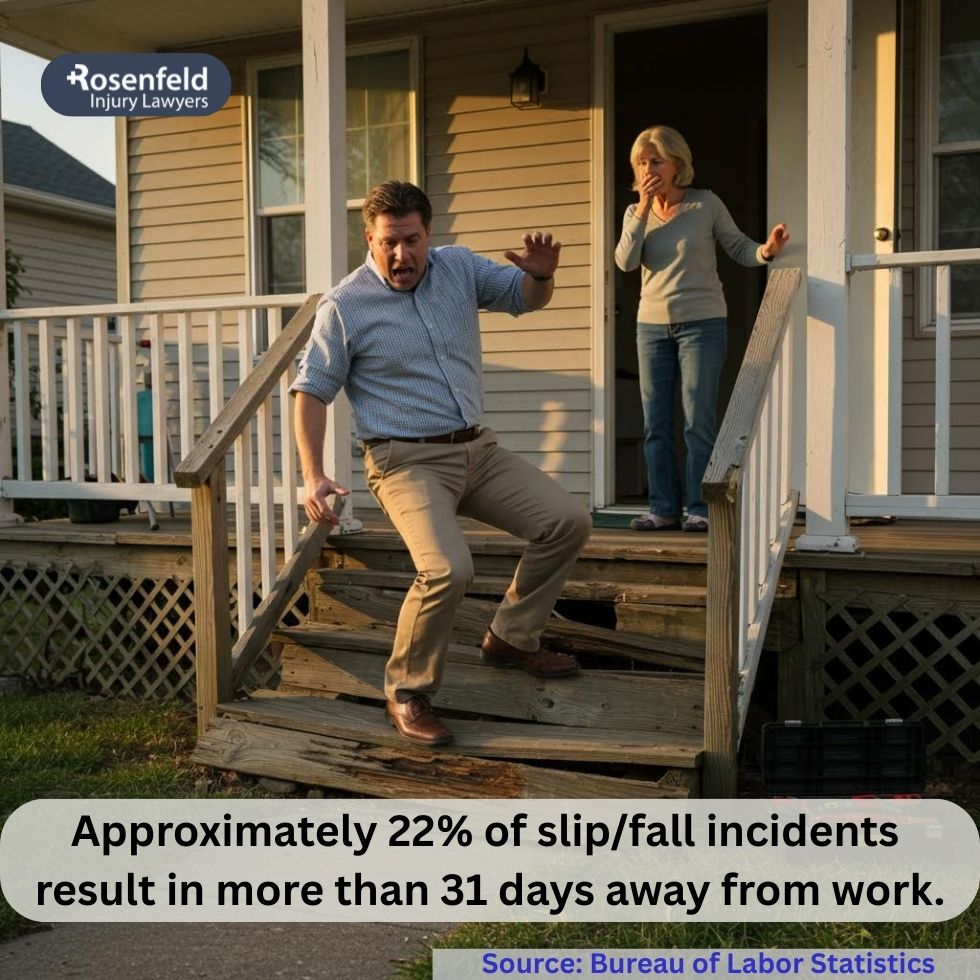
How Important Is Medical Documentation in a Slip and Fall Lawsuit?
Medical documentation plays a central role in any slip-and-fall lawsuit. Your medical records serve as objective proof of the injuries you sustained, the treatment you required, and the impact on your daily life. Without clear documentation, it becomes difficult to link your injuries to the fall incident or justify the compensation you’re seeking.
Emergency room visits, diagnostic tests, surgical reports, physical therapy notes, and prescriptions all help establish the extent of your injuries. They also support claims for medical bills, future medical treatment, and non-economic damages like pain and suffering.
Insurance companies and defense attorneys often try to argue that an injury was pre-existing or exaggerated—detailed treatment records make those arguments harder to prove.
Seeing a doctor promptly after the fall is equally important. Delays in treatment can be used against you, so it’s critical to seek care and maintain records from the start.
What Should I Do Before Filing a Slip and Fall Lawsuit in Chicago?
Seek Medical Attention for Any Injuries Sustained
Getting prompt medical care after a slip and fall accident is essential for your health and your lawsuit. It creates a record of the injuries sustained and ties them directly to the fall. Delaying care may hurt your recovery and give the insurance company reason to challenge your claim.
Gather Evidence to Support Your Slip and Fall Claim
Photograph the scene, your injuries, and anything that may have contributed to the fall, like wet floors or broken steps. Request an incident report if the fall happened at a business or public location. Get witness names and contact information. This documentation strengthens your case and helps prove negligence.
Consult a Slip and Fall Attorney
Before filing a lawsuit, speak with an experienced Chicago slip and fall lawyer. They can evaluate your case, handle communication with the insurance company, and ensure you meet legal deadlines. Many offer free consultations and work on contingency, meaning no upfront fees.
What Does the Slip and Fall Lawsuit Process Include?
Filing a Complaint
A slip and fall lawsuit begins with filing a formal complaint in the appropriate Illinois court. This legal document outlines the injured party’s allegations, the property owner’s negligence, and the damages being sought.
Once filed, the complaint is served on the defendant, who then has a limited time to respond. Filing officially starts the legal process and preserves your right to receive fair compensation for injuries related to the fall.
Discovery
During discovery, both sides exchange evidence and information related to the slip-and-fall incident. This phase can include written questions (interrogatories), document requests, and depositions of witnesses, other parties involved, or the injured. Discovery helps both sides evaluate the strength of the claim and defense.
For example, your attorney may obtain maintenance logs, surveillance footage, or accident reports. The discovery process is essential in proving the owner’s negligence and building a case for compensation based on the severity of the injuries and the conditions that caused the fall.
Settlement Negotiations
Most slip and fall cases in Chicago are resolved through settlement rather than trial. Once both parties understand the strengths and weaknesses of the case, your attorney will begin negotiations with the negligent party’s insurance company. These discussions typically involve a demand letter backed by evidence such as medical records, photos, and witness testimony.
Settlement talks may happen at any point during litigation and often occur after discovery ends. If a settlement is reached, it avoids the stress and time commitment of a trial while still providing compensation for medical expenses, lost income, and other damages.
Trial
If the parties cannot agree on a settlement, the case moves to trial. A judge or jury will hear arguments, review evidence, and determine whether the property owner was negligent. Your lawyer will present your case, call expert witnesses if needed, and challenge the defense’s claims.
Trial outcomes depend heavily on credibility, documentation, and how clearly the negligence caused the injuries. While less common, trials can lead to higher compensation in strong cases. Verdicts are binding but may be subject to appeal, which can extend the resolution timeline.
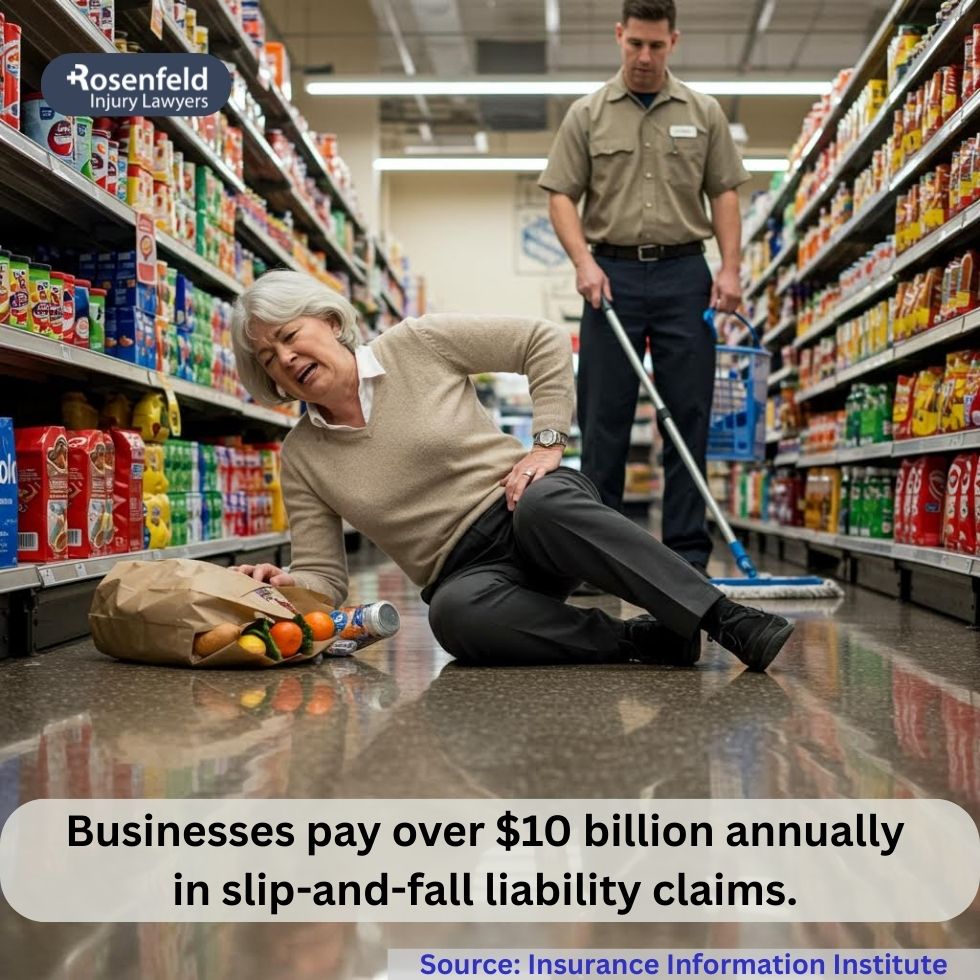
How Does a Chicago Slip and Fall Lawyer Help?
The slip and fall lawsuit process can be stressful and complicated, especially while recovering from injuries. Property owners often deny liability, and insurance companies may downplay your claim or offer low settlements. A lawyer helps level the playing field.
With experience handling local premises liability cases, your attorney will manage the entire legal process—from gathering evidence and identifying liable parties to negotiating a settlement. We’ll also make sure deadlines under Illinois law are met and that your rights are protected throughout the case.
Accurate Evaluation of Damages
One of the most important roles your attorney plays is calculating the actual value of your slip-and-fall claim. That includes reviewing treatment records, lost wages, expected future medical costs, and how your injury has affected your daily life.
At Slip & Fall Injury Lawyers, we work with medical experts and financial professionals to project long-term losses and ensure your claim reflects both economic and non-economic damages. This comprehensive evaluation helps you pursue the fair compensation you’re legally entitled to receive.
Proving Negligence
To win a slip and fall claim, you need to prove the property owner’s negligence caused your injury. That means showing they owed you a duty of care, breached that duty, and that the breach led directly to your fall and resulting damages. Our firm investigates property maintenance records, surveillance footage, witness statements, and any prior complaints about similar hazards.
We also analyze building codes, weather data, and inspection reports to support your case. This evidence is essential to holding the negligent party accountable and strengthening your position during settlement or trial.
What Types of Compensation Can I Recover in a Slip and Fall Lawsuit?
If you were injured in a slip and fall accident caused by someone else’s negligence, you may be entitled to several forms of compensation through a personal injury lawsuit. These damages are meant to address both the financial burden of your injury and its impact on your quality of life.
Economic damages cover the actual financial losses tied to your fall. This includes medical expenses for emergency care, surgery, physical therapy, and any necessary future treatment. You can also claim compensation for lost wages if your injury forced you to miss work, as well as any diminished earning capacity if you’re no longer able to return to your job or work in the same capacity.
Non-economic damages are awarded for harder-to-measure losses, such as physical pain, emotional distress, and the loss of enjoyment of everyday activities. If the fall led to permanent disability, disfigurement, or ongoing limitations, these can significantly increase your compensation.
In some cases, if the property owner’s actions were especially reckless or willfully negligent, punitive damages may also be considered. A skilled lawyer can evaluate your claim and pursue the full range of damages available under Illinois law.
How Long Do I Have to File a Slip and Fall Lawsuit in Chicago?
In Chicago, the statute of limitations for filing a slip and fall lawsuit is generally two years from the date of the accident. This time limit is set by 735 ILCS 5/13-202, part of the Illinois Code of Civil Procedure. If you don’t file your lawsuit within this window, you could lose your right to seek compensation altogether—even if you have a strong case.
What Makes Us the Best Choice for Your Slip and Fall Case in Chicago
At Slip & Fall Injury Lawyers, our team combines decades of experience with deep knowledge of Chicago’s courts and property laws. We’ve recovered millions for clients injured due to unsafe conditions in apartment buildings, retail stores, construction sites, and more. We work on a contingency fee basis, meaning you owe nothing unless we recover compensation for you.
Our law firm has been recognized by Super Lawyers and the Million Dollar Advocates Forum. Backed by these honors and a long history of successful outcomes, we’re equipped to handle your slip and fall case with the focus it deserves.
Slip and Fall Lawsuit FAQs
Can I file a slip-and-fall lawsuit without an accident report?
Yes, you can still file a slip and fall lawsuit even if an incident report wasn’t made at the time of the incident. However, not having one may make proving your claim more difficult. Witness statements, photos, treatment records, and other documentation can help support your case. A slip and fall lawyer can help strengthen your claim by gathering this evidence.
Why are slip-and-fall cases hard to win?
Slip and fall cases are often tricky because proving negligence isn’t always straightforward. You must show they knew or should have known about the hazard and failed to fix it. Defendants often argue the hazard was obvious or that the injured person wasn’t paying attention. Solid evidence and legal strategy are key to overcoming these defenses.
Do most slip and fall cases go to trial?
No, most slip and fall cases are resolved through an out-of-court settlement. Trials are costly and time-consuming, so both sides often prefer to reach an agreement during settlement negotiations. However, if the insurance company refuses to offer a fair settlement, your attorney may recommend taking the case to trial to seek a better outcome.
What is the average slip-and-fall lawsuit payout?
Payouts vary widely depending on the severity of injuries sustained, liability, and available insurance coverage. Minor injuries may settle for under $50,000, while severe cases involving surgery or permanent disability can reach six or seven figures. In Chicago, settlements commonly range from $100,000 to over $1 million in severe cases. An experienced personal injury lawyer can help estimate your case’s value.
Can you get a slip-and-fall settlement without a lawyer?
You can technically settle without a lawyer, but it’s risky. Insurance companies may offer less than what your injuries are worth and pressure you to accept a quick payout. A slip and fall lawyer will protect your rights, evaluate your damages accurately, and negotiate for a fair settlement, often recovering far more than unrepresented claimants receive.
Get Started with the Legal Process!
If you or a loved one has been injured in a slip and fall accident in Chicago, don’t wait to protect your rights. At Slip & Fall Injury Lawyers, our team is committed to helping injured victims recover fair compensation for medical expenses, lost wages, and pain caused by someone else’s negligence.
We’ve handled thousands of slip and fall cases across Illinois and understand what it takes to hold property owners accountable. Your consultation is always free, and we work on a contingency fee, so you pay nothing unless we win. Contact us today to schedule your case review.
Content reviewed by Chicago slip and fall accident lawyer Jonathan Rosenfeld of Rosenfeld Injury Lawyers LLC, who holds property owners and management companies accountable to obtain justice for injured visitors and tenants, and is a trial lawyer recognized by Super Lawyers, Lawyer Legion, and Distinguished Justice Advocates for premises liability litigation.







